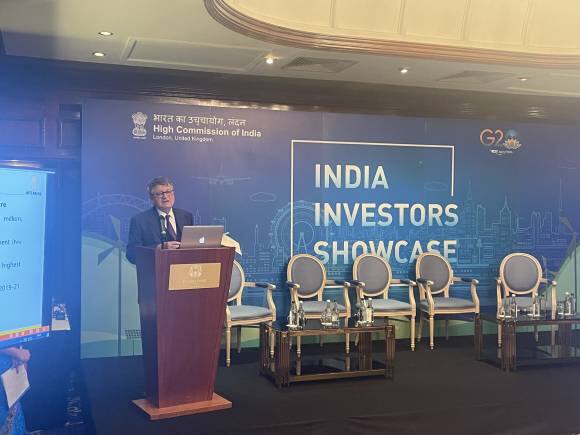



A half-day India Investor Showcase organised by the Indian High Commission in London saw good attendance by various stakeholders from Rolls-Royce to British diplomats, and City of London officials to the UK Department of International Trade (DIT). The star speaker was Suman Bery, the vice-chairman of Niti Aayog, who spoke about the strong basis for India’s stability in a region which has seen economic upheavals, and military dictatorships.
“Political resilience is important to economic resilience. A stable democracy with a popular government provides a strong basis for India’s stability,” said Bery, reminding those present that there has been a paradigm shift in public service delivery leading to sustainable and inclusive growth.
Providing a larger picture, Bery pointed out that what makes India reliable and different is the role of governance. “Five continuous full term five-year governments at the centre is a no mean task,” said Bery. He also expounded on the model of “cooperative and competitive federalism” that was coined by Prime Minister Narendra Modi. “States are equal partners of the centre in development and spurring growth.”
Bery pointed out that India has been less successful in manufacturing as compared to some other Asian countries. “Manufacturing and its twin employment have been weaker parts of India’s performance even though we have a Make in India agenda,” he said, and hinted that the India-UK FTA could address this. “There is a recognition that UK plc is also home to sophisticated manufacturing and an aspiration of the FTA should be to make India an integrated partner, in both directions, into capabilities in both research and technology that Britain brings to the table.”
However, the production-linked incentive scheme, which Niti Aayog helped in devising, has been instrumental in incentivising foreign manufacturers to start production in India. This has led to success stories and one of the most prominent ones has been Apple coming to India to assemble iPhone.
Mark Tucker, group chairman, HSBC who sent a video message said that some analysts predict that India could manufacture 25 per cent of all iPhones by 2025. He pointed out that India is highly under leveraged, but is likely to be a major beneficiary of global supply-chain shifts. “India is now a go-to destination for global manufacturers seeking to diversify and build resilience into their supply chains.” Outside its biggest market in the UK, HSBC has a major presence in India, and Tucker praised the Public Private Partnerships (PPP) which are driving the universal payment system.
There were panel discussions and presentations from Rahul Agarwal, vice-president, Invest India, Richard Heald, chair, the UK India Business Council (UKIBC); Jaakko Koorooshy, global head, sustainable investment research, FTSE Russell, LSEG, V Lakshmikumaran, legal advisor, department of commerce, India; Shravan Joshi, policy head, City of London corporation; and Parasad Gadkari, chief strategy officer, National Investment and Infrastructure Fund Limited.
 Suman Bery at the India Investors Showcase in London. (Photo: Danish Khan)
Suman Bery at the India Investors Showcase in London. (Photo: Danish Khan)
Vikram Doraiswami, the high commissioner for India, highlighted the key drivers of India’s growth — a growing middle-class, GDP growth and the decentralised nature of growth in India. He also highlighted the green transformation in India and how India’s growth story makes it imperative to partner with like-minded countries like the UK. There were also comments and questions on the portrayal of India in the foreign press and the persistent grievance of the slow judicial process in India.
Bery who has worked in World Bank and as chief economist with Shell cited the example of Hindustan Unilever Limited that has enjoyed huge success in India because of its perseverance. “An iconic organisation has been Hindustan Unilever, and India has been a huge supplier of global talent to its global board. This is a firm that made a bet on India 60 years ago and has never looked back. A former chairman of Unilever made the point that India does not reward those who tremble on the edge waiting for the water to be just right; it is too large, complicated and diverse. People who have committed wholeheartedly to India and navigated the complexity of our society have not regretted it either in terms of profitability or in terms of fair treatment.”
Speakers pointed out that the attraction of India’s domestic market, ease of doing business, informed targets in infrastructure, and huge opportunity in the MSME sector have contributed in changing the perception of India over the years. Bery shared anecdotes about being told that EU and British firms were in China because they felt they had no option, even though it was not much profitable and came with all kinds of riders like sharing of technology, and relatively little protection of Intellectual Property Rights. Seeking to draw a different picture of India vis-à-vis China, Bery said that a “careful examination of record would suggest that that has not been the experience of UK plc in India.”
Using the example of Shell which has its second-largest technology centre in Bengaluru, he highlighted how India’s talent pool has contributed to the R&D sector globally. “India presents a large talent pool and a large market and those are the fundamentals for taking India seriously.”
Discover the latest Business News, Sensex, and Nifty updates. Obtain Personal Finance insights, tax queries, and expert opinions on Moneycontrol or download the Moneycontrol App to stay updated!
Find the best of Al News in one place, specially curated for you every weekend.
Stay on top of the latest tech trends and biggest startup news.